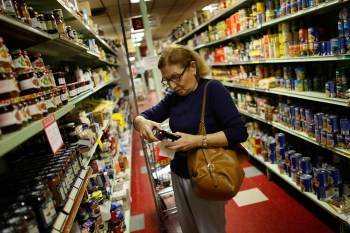A local model for global sustainability
TEXT OF STORY
Kai Ryssdal: We live in the world’s most modern and convenient economy. If you want something within your means, all you have to do is go out and buy it. Convenient doesn’t always mean smart, though. Our Sustainability reporter Sam Eaton checked out some people who think they’ve come up with a better way to organize an economy. Whether it’s modern or not depends on your point of view.
Sam Eaton: The wooded outskirts of Bellingham, Washington, may not look like the epicenter for a new economic model. But looks, and sounds, can be deceiving.
Sound: (Sawing wood)
Wesley Smith: My name’s Wesley Smith. I’m one of the owners of Smith & Vallee Woodworks. We build out of locally harvested woods, primarily.
Smith is an old-fashioned furniture maker who keeps his customers and his suppliers local.
Smith: We call our neighbor Duane for another tree, and we can hear the chainsaws running, and we can hear the tree hit the ground — and we know our tree’s ready.
Smith says keeping all the steps of production within a quarter mile of his workshop is not only better for the planet, it reduces his transportation costs considerably.
Smith: The cheapest input, you know, I mean it could be just right in your back yard. It doesn’t have to come from an Indonesian forest.
Now, if you took this neighborly business-to-business relationship across an entire town, you’d have a self-sustaining, local economy. Then imagine that model spread around the whole world, and you’re glimpsing the revolutionary vision of the new “buy local” movement. It’s anti-globalization on a global scale. The movement has even begun to spawn conferences with standing-room only.
Don Shaffer: Our vision is not to just have strong groups in Bellingham and Boulder, Colorado, and Madison, Wisconsin — the places where you might imagine that this would take root — but to go well beyond that. And we see a sustainable global economy as a network of local living economies.
Don Shaffer heads the movement’s main trade group, the Business Alliance for Local Living Economies, or BALLE. He says these local economies add up to a $40 billion sector, and they’re growing fast.
Shaffer: There’s a lot of talk about local economies being the next “green” or the next “organic.”
In order to be self-sustaining, some towns have minted their own currencies, which can only be used to buy local products. There are even efforts underway to create local stock exchanges.
Michelle Long: We want this to be a real model, a real example of what’s possible.
Michelle Long heads the Bellingham nonprofit Sustainable Connections, which promotes local businesses and markets. She says the Pacific Northwest, with its cornucopia of forests, farms and fisheries, is uniquely suited to lead this economic revolution.
Long: We have this place where we can really have our own economy and re-imagine things from the ground up. So we can look at how can we grow and distribute food. How do we shelter ourselves? How do we power our lives? How do we define success in business?
Long takes me on a tour of Bellingham’s historic Fairhaven neighborhood. This cluster of restored brick buildings has become a Petri dish for self-sustaining local economies.
Long: And as you can see, there’s lots of activity, lots of people in the streets, lots of things going on. People living here, people working here, people shopping here. Well you can see, it’s a really thriving community.
Environmental writer Bill McKibben has become the movement’s de facto spokesman. He says this scene of bustling local businesses isn’t just feel-good, it’s the very foundation of modern economics.
Bill McKibben: Adam Smith was describing exactly the kind of local economies that I’m talking about in his work, you know? His famous butcher and baker and things enriching themselves were members of a circumscribed local economy.
McKibben rejects criticism that he’s an idealist who just wants to turn back the clock to 19th-century localism. The utopians, he says, are the ones who think our rates of consumption can keep on growing forever. McKibben says environmental pressures such as global warming and diminishing resources have a timetable of their own.
McKibben: We’re going to end up in more localized and rugged economies than we have at the moment. And we’re either going to do it because we decide that it’d be nice to do it or because we don’t have much choice. And it will probably be some combination of the two.
In Bellingham, Washington, I’m Sam Eaton for Marketplace.
There’s a lot happening in the world. Through it all, Marketplace is here for you.
You rely on Marketplace to break down the world’s events and tell you how it affects you in a fact-based, approachable way. We rely on your financial support to keep making that possible.
Your donation today powers the independent journalism that you rely on. For just $5/month, you can help sustain Marketplace so we can keep reporting on the things that matter to you.


















